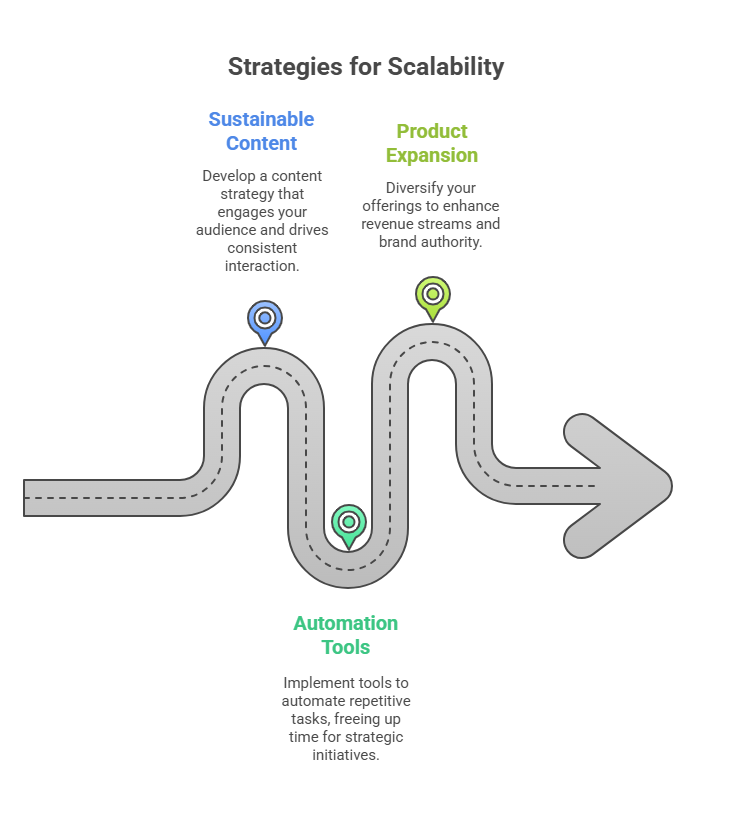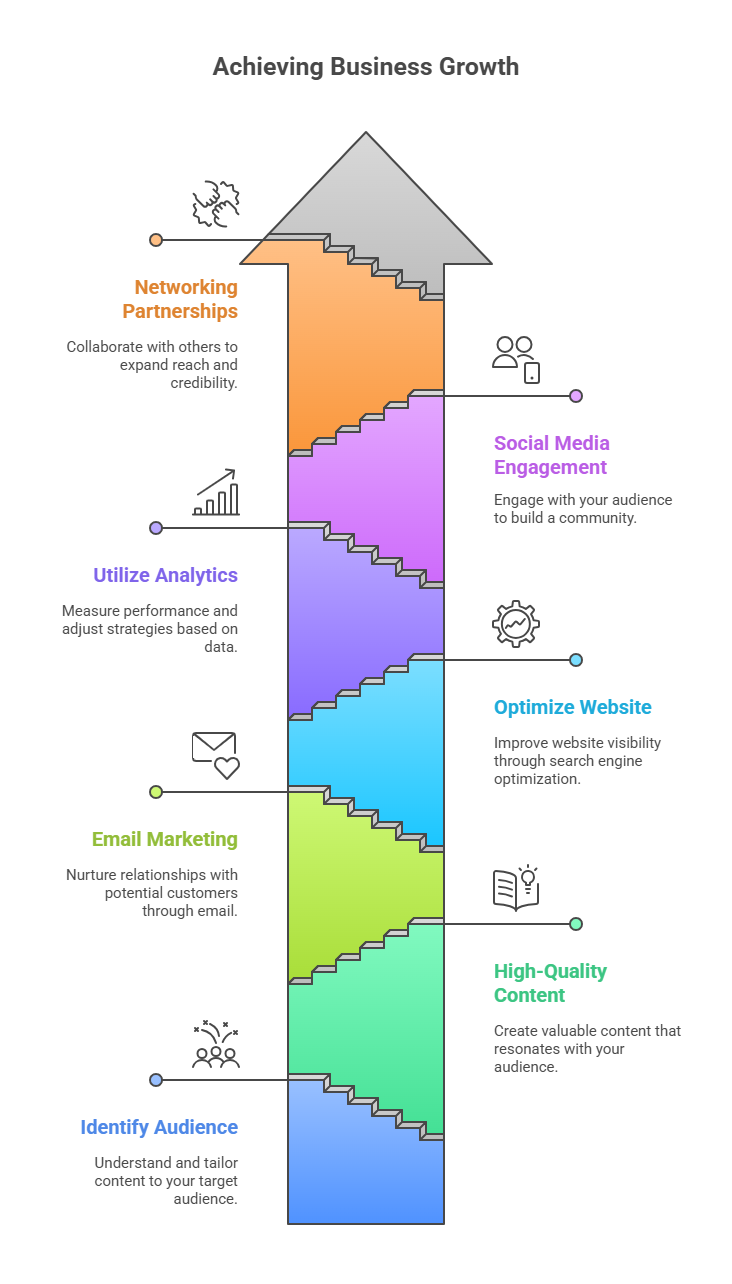Contents
This guide will walk you through the vital steps to establish a sustainable and scalable information marketing business that stands the test of time. You’ll learn how to effectively identify your target audience, develop valuable content, and implement proven strategies to generate leads and increase conversions. By focusing on continuous growth and leveraging technology, you can create a business model that not only thrives but also adapts to the ever-changing market landscape. Let’s explore the process of building your information marketing empire!
Key Takeaways:
- Identify a specific niche and target audience to tailor your information products, ensuring they address their unique pain points and preferences.
- Utilize various marketing channels and automation tools to efficiently reach and engage your audience, allowing for scalability in your marketing efforts.
- Continuously gather feedback and analyze performance metrics to refine your offerings and improve customer satisfaction, fostering loyalty and repeat business.
Understanding Information Marketing
A successful information marketing business revolves around the creation, distribution, and sale of valuable knowledge products, such as ebooks, courses, or webinars. By leveraging your expertise, you can educate your audience while generating revenue, making it a sustainable and scalable business model. This chapter will guide you through the fundamentals of setting up your own information marketing venture effectively.
What is Information Marketing?
Assuming you’re new to the concept, information marketing refers to the process of disseminating valuable knowledge or digital products tailored to meet the needs of a specific audience. This business model empowers you to monetize your expertise by creating products that educate, inform, or entertain, ultimately positioning you as an authority in your niche.
Key Components of a Successful Information Marketing Business
Marketing is important for your information marketing success. It involves developing a strategy to reach your target audience effectively, nurturing relationships, and optimizing your sales funnel. By employing various tactics, such as content creation, social media engagement, and email marketing, you can maximize your reach and impact, driving conversions and revenue growth.
Information plays an integral role in determining the effectiveness of your marketing strategy. You should focus on creating high-quality content that addresses your audience’s pain points and interests. Understanding your target market and staying updated with industry trends can help you curate relevant products and services. Establishing trust and credibility is key to fostering long-term relationships with your audience, ensuring sustainable success in your information marketing endeavors.
Factors for Sustainability
It is important to recognize key factors that contribute to the sustainability of your information marketing business. Focus on elements such as:
- Consistent audience engagement
- Quality content production
- Effective marketing strategies
- Financial management
Any changes you make should align with your goals for growth and adaptability. For more insights, you can explore Eight Strategies For Sustainable Growth In The Digital Age.
Identifying Target Audience
One of the first steps towards sustainability in your business is identifying your target audience. Understanding who they are will help you tailor your marketing efforts and create products that resonate with them.
Creating Valuable Content
Clearly, producing valuable content is integral to keeping your audience engaged and attracting new customers. High-quality content that provides genuine solutions or insights will set you apart from your competitors.
With your focus on creating valuable content, aim to address the specific needs and pain points of your audience. This could involve delivering how-to guides, expert interviews, or case studies. The more aligned your content is with the interests of your audience, the more likely they are to engage with your brand and share your ideas further, thus driving sustainable growth.
Strategies for Scalability
Your ability to scale your information marketing business lies in implementing effective strategies that allow you to expand your reach without sacrificing quality. One of the foundational steps is to Create a Sustainable Content Strategy that resonates with your target audience and drives consistent engagement.
Leveraging Automation Tools
Any successful information marketer knows the power of automation tools. By automating repetitive tasks like email marketing, social media posting, or customer relationship management, you free up valuable time. This allows you to focus on strategic initiatives that drive growth while ensuring that your operational processes run smoothly and efficiently.
Expanding Product Offerings
On the path to scalability, diversifying your offerings can significantly enhance your revenue streams. By introducing complementary products or services tailored to your existing audience, you create more opportunities for engagement and sales.
Product expansion not only increases your market reach but also enhances your brand authority. Consider launching courses, consultancy services, or exclusive membership sites that align with your core offerings. Each new product should deliver added value to your audience, deepening their connection with your brand and encouraging loyalty over time.

How to Build an Effective Sales Funnel
Now that you understand the importance of a sales funnel in your information marketing business, it’s time to focus on crafting an effective one that drives leads and conversions. A well-structured sales funnel guides your audience seamlessly from awareness to decision-making, ensuring they engage with your offerings at every stage. Utilizing strategies tailored to your target audience will allow you to build trust and capture more sales.
Steps to Create Your Sales Funnel
Funnel creation begins with mapping out each stage: awareness, consideration, and conversion. Start by defining your target audience and designing engaging content that resonates with their needs and pain points. Next, utilize lead magnets to capture attention and nurture leads through email marketing and retargeting ads, ultimately guiding them toward making a purchase.
Optimizing User Experience
To ensure your sales funnel is effective, it is crucial to focus on optimizing user experience at every touchpoint. A seamless and enjoyable journey will keep potential customers engaged and motivated to take action, making it easier for them to transition through your funnel.
Steps to enhance user experience include improving website navigation, ensuring that your content is easily digestible and relevant, and simplifying the checkout process. Use analytics to identify any bottlenecks where users may drop off. Provide clear calls-to-action and consider elements such as mobile optimization, page load speed, and personalized interactions, which all contribute to a more pleasant experience, leading to higher conversion rates.
Marketing Tips for Growth
For your information marketing business to thrive, adopting effective marketing strategies is imperative. Consider the following tips:
- Identify your target audience and tailor your content accordingly.
- Invest in high-quality content that provides real value.
- Leverage email marketing to nurture relationships with potential customers.
- Optimize your website for search engines to increase visibility.
- Utilize analytics to measure performance and adjust strategies.
Recognizing the importance of these strategies will help drive sustainable growth for your business.
Utilizing Social Media Effectively
On social media, you have the opportunity to engage directly with your audience, fostering a sense of community around your brand. Share valuable content consistently, interact with followers, and utilize various platforms to reach different segments of your audience. By using targeted advertising and monitoring engagement metrics, you can refine your approach and grow your following.
Networking and Partnerships
Social connections are key to expanding your business reach and establishing credibility. You should actively seek partnerships with other professionals in your niche, as collaboration can lead to mutually beneficial outcomes. Attend industry events, participate in online forums, and engage in discussions to build relationships.
Utilizing networking and partnerships effectively can significantly enhance your brand visibility. By aligning yourself with other respected figures in your area of expertise, you gain access to their audience and resources, expanding your influence. Look for opportunities to collaborate on projects, webinars, or co-promotions, as these partnerships provide a platform for shared growth. Building a strong network can lead to referrals, joint ventures, and valuable insights that enhance your information marketing efforts.

Measuring Success and Making Adjustments
Unlike traditional businesses, information marketing requires you to continuously measure your success and make necessary adjustments. By regularly assessing your performance metrics, you can ensure that your strategies align with your goals and adapt quickly to market trends. This iterative process allows you to optimize your business model, ensuring sustainability and scalability in an ever-changing landscape.
Key Performance Indicators (KPIs)
For effective measurement of your information marketing business, defining clear Key Performance Indicators (KPIs) is imperative. These metrics help you track various aspects, such as customer acquisition, engagement, and conversion rates. By regularly reviewing your KPIs, you can gain valuable insights into the effectiveness of your strategies and make informed decisions for future initiatives.
Continuous Improvement Techniques
Any successful business thrives on continuous improvement techniques that empower you to refine your processes and strategies. Regularly soliciting feedback from your audience, conducting A/B testing, and analyzing your content’s performance can unveil areas of opportunity, helping you to make necessary adjustments for better results.
KPIs serve as your guiding compass in evaluating the effectiveness of your marketing efforts. They indicate areas requiring attention and provide valuable insights into your audience’s behavior. By analyzing these metrics, you can identify patterns and trends, which will help you make data-driven decisions and drive improvement in your content, marketing strategies, and overall business processes.
Final Words
Considering all points, establishing a sustainable and scalable information marketing business requires a clear strategy, consistent content creation, and a deep understanding of your audience’s needs. Focus on building strong relationships, leveraging technology, and continually refining your offerings to stay relevant. By prioritizing quality and ethical practices, you’ll enhance your credibility and foster long-term success. Stay adaptable and committed to learning as the landscape evolves, allowing your business to grow and thrive in the competitive marketplace.








